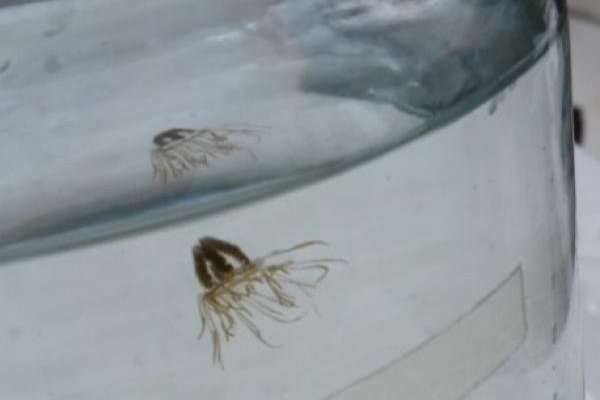
June 05, 2019
 Photo courtesy/New Jersey Department of Environmental Protection
Photo courtesy/New Jersey Department of Environmental Protection
Researchers have found that clinging jellyfish, a spider-like invasive species with a powerful and debilitating sting, have reappeared in New Jersey waters for the fourth straight year.
The toxic clinging jellyfish species that has tormented parts of New Jersey for three years has made its way to North Wildwood, state officials confirmed.
The spider-like jellyfish, armed with anywhere from 60 to 90 tentacles, delivers a sting so potent that some patients have had to be administered a morphine drip in the hospital.
Prior to the discovery in North Wildwood, the tiny jellyfish had been confined to parts of northern and central Barnegat Bay, in addition to the Metedeconk and Shrewsbury rivers, according to the New Jersey Department of Environmental Protection.
The North Wildwood specimens were spotted by a young girl in a saltwater pond adjacent to East First Avenue near the Hereford Inlet Lighthouse. The girl's parents, suspecting their daughter had found the clinging jellyfish, contacted experts. The girl was not harmed.
Officials said it was unclear how the species entered the pond, but it's possible they may have arrived through a stormwater pipe or from the Hereford Inlet. About 150 of them were collected at the pond.
While the area has never been open to swimmers, officials are warning residents and visitors to be alert while in the area.
Clinging jellyfish are nearly invisible, measuring from 1 to 9 millimeters in diameter. The non-native species has a red, orange or violet cross across its middle. They primarily feed on zooplankton and attach to submerged vegetation in back bays and estuaries. These areas are not generally used for swimming.
Since their arrival, clinging jellyfish have been monitored in a collaboration between the New Jersey DEP and researchers at Montclair State University, who have created an interactive map of their locations.
Researchers are also trying to determine the impact of the species on native vegetation and how they arrived in New Jersey.
If you're stung by a clinging jellyfish, the New Jersey Department of Environmental Protection, recommends doing one or more of the following:
• Apply white vinegar to the infected area
• Rinse with saltwater and remove any tentacle materials with a glove or heavy towel
• Apply cold packs or ice to alleviate pain
• Seek medical attention if symptoms persist